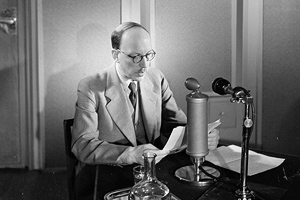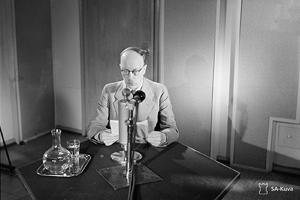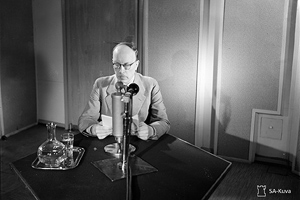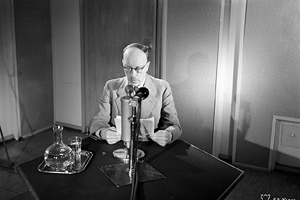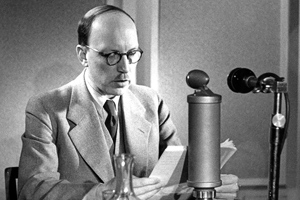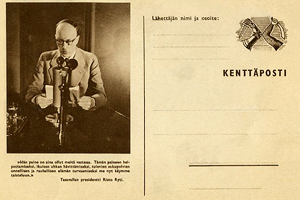Radio address by President of Finland Risto Ryti 26 June 1941
|
|
Citizens! Our peace loving people, which for more than a year have strained to utmost to once again rebuild their country to flourish in the aftermath of the previous war, has once again been made the target of vicious attack. Once again it is the same enemy, which during in excess of half a century has over short intervals in total for some 100 years by ravaging, shattering, and murdering waged wars against our small nation, violated our territory, with their air arms slaying peaceful citizens, mainly the aged, women and children and destroying the property of peaceful citizens. From the instant of commencement of hostilities between Germany and Soviet Union, numerous instances of border violations have been committed by the Soviet Union, for which we have expressed our most vigorous protests, all to no avail. As of yesterday the military forces of Soviet Union have without regard to agreements and without any cause being supplied by us, committed on the orders of their government regular, wide-scale military operations in all regions of our country, and in keeping with their habits, primarily targeted these operations towards sparsely populated areas and peaceful civilian population. In this manner has commenced our second battle for defence only some 19 months since occurrence of the previous attack. This new attack towards Finland is as if it were a culmination point for that mode of politics which the Soviet Union has ever since the Moscow peace settlement utilized towards Finland, and the purpose of which has been the destruction of our independence and enslavement of our people. Having been left wanting for military assistance during the 1939-40 winter war, we had no choice except for during the dark moments of night on the March 13th conclude peace with Soviet Union, which after the successful defensive battles conducted with substantial casualties felt paralyzing to us. From the terms of peace we were able to perceive the ultimate intentions of USSR in dictating these terms. The new boundary was ordered to be such, as to destroy the possibility of Finland defending itself. The border was to run across natural lines of defence and in such manner that road network was disabled. In making the peace, the USSR obtained a starting point that from the military point of view was advantageous in case of renewed warlike attacks. That, however, is not all. In order to totally deprive Finland of any defensive capacity against attack by their immense military forces, the Soviet Union demands both the naval base of Hanko as well as building of the Salla railway. The argument for renting of Hanko base has been stated as being that, the Soviet Union must have this key area of the Gulf of Finland in order to secure the safety of their large seaside city of Leningrad. The hanko based troops do not, however, indicate seaborne battle capacity, in as much as attack capacity, and in particular, land-based attack. A sea battle does not require large armored tank troops or enormous railway-based artillery. The Hanko based troops principally comprise of those assembled for rapid attack occurring on land. Hanko is like a pistol aimed directly at heart of Finland. Neither the demand for construction of Salla railway nor North-east Finland area secession demands were included in the advance notification of terms of peace which were bough to notice of Finnish cabinet. The railway of Salla, by which it is intended to join the railway network of Finland to the Murmansk railway, in all probability would comprise of a new route of attack being available to USSR. Threat of this demand for railway encompasses the entire Northern Scandinavia, but is in the first instance a dagger aimed at Finland’s back. During the peace negotiations Soviet Union notified as final and absolute point of view that the reached agreement fully meets the demands of USSR. Representatives of the Soviet Union considered it to guarantee the safety of Leningrad, enabling the security of which was notified as being the reason for commencement of hostilities. Likewise, the Russian negotiators assured the peace agreement guarantees safety of the railway running North-west of lake Laatokka, which the USSR considered to be important for their network. Additionally, the negotiators assured that how Finland arranges and decides their internal as well as external political matters is entirely dependent on it, as well as is how it arranges its fiscal policy. The Soviet Union has no interest in these matters. Even though us Finnish have had painful experiences regarding how little both the man’s word as well as the agreements given by the USSR means, we would have expected that their words would have been at least binding at basic points, and at the very least for a short while. However, once again we have directly come to realize that no word given by the USSR can be relied upon. Regardless of what had been promised regarding intervention in Finland’s foreign policy, the Soviet Union bought forward demands regarding direction of Finland’s foreign policy. After the concluded severe battles, considerable losses and wanting for assistance of field equipment; our country was totally defenseless against possible further attacks by Soviet Union. In order of safeguarding to at least some measure the existence of our country, the cabinet of Finland commenced talks designed to achieve formation of a Northern League of Defence. These discussions were made public on the same day as the peace agreement had been concluded in Moscow. While the articles of the peace agreement were being dealt with by Finnish parliament on March 21st the USSR in Moscow made known their strict opposition to this plan, totally without foundation claiming it to be in disagreement with the peace agreement. In respect of the same foreign policy matter the Soviet Union further three times with threatening note intervened in our right of self determination: on the 27th of September 1940, on our independence day of the same year, and two weeks following that, on the December 18. This occurred regardless of the above mentioned idea of League of Defence not by any means being aimed against anybody, merely to safeguard these sister nations. In contravention of international covenants and practices, Soviet Union’s diplomatic and consular representation in Finland has undertaken intervention with regard to Finland’s domestic situation as well as spying, even appearing for this purpose with a false name. With regard to this matter, the staff numbers at USSR representative office have increased more than substantially. At the Helsinki mission, there are 31 diplomatic corps staff and 120 assisting staff. At the Consulate in Petsamo, 3 consular staff and 21 assistance staff, at Mariehamn 8 consular staff and 30 other staff. In total there have been some 42 diplomatic and consular staff and 171 assistant staff employed at the USSR mission. With the aid of their mission, as well as by utilizing the assistance of those citizens of Finland who have been agreeable to exchange their country for the silver coins of Judas, the USSR has unscrupulously attempted to interfere with Finland’s internal affairs. By supporting and financing Finland – Soviet Union Friendship Association’s subversive and revolutionary actions, which were in a matter-of-fact way being led and incited from Moscow, Soviet Union endeavored to instill similar developments in Finland, which it has achieved in the Baltic countries. The Soviet Union has even undertaken attempts to interfere in internal staff matters and apply pressure in these matters. The propaganda and spying by Soviet Union within Finland become ever more unscrupulous and active. Every Finnish citizen who the Soviets have managed to get hold of, prisoners of war included, has been either tried to be enlisted or forced to undertake spying against Finland. Soviet Union’s propaganda has inspired feelings of hate towards cabinet of Finland and members of government. It has tried to spread Bolshevism and Bolshevik style thinking in Finland. The latest example of Soviet Union’s continuously in ever differing situations shown disrespect is the recent proposal originating from Soviet Union’s official sources, that a certain person convicted in connection of the largest instance of spying in Finland and currently serving the sentence, would be freed and permitted do depart for Soviet Union. Soviet Union’s political and fiscal demands over and above those stated in the peace terms extended to many different matters and become from Finland’s security point of view ever increasingly precarious. I will mention a few of these. On Midsummer’s eve last year Soviet Union surprisingly opened the matter of Ahvenanmaa (Åland Islands), which was not included in the peace agreement documents. When this was pointed out as a way of warding off the demand, Commissioner for Foreign Affairs Molotov cynically announced that the Soviet cabinet had not bought the matter of Ahvenanmaa (Åland Islands) forward in connection of peacemaking because this may have disturbingly affected the peace negotiations. The Soviet Union now demanded that Ahvenanmaa (Åland Islands) had to be demilitarized, defense equipment located there destroyed, and Soviet Union itself had to be permitted to control all works of destruction. With these demands the Soviet Union clearly wanted to reserve itself the opportunity to effortlessly occupy the Ahvenanmaan (Åland) Islands, whenever a suitable moment occurred. During same timeframe, approximately a year ago, Soviet Union stated their demands for nickel mines of Petsamo. It was not satisfied with demanding a share of the mines production, but its demands had a directly political stamp. For example, the Soviet Union demanded that it be handed management of the mines and right to put in place a fifth of the employees. Locating this number of men in the Petsamo area, would have meant that the Soviet Union would in practice also have had a military support base in Petsamo. Descriptive of the Soviet Union’s two-faced actions was that the nature of their demands in the matter of the Petsamo nickel mines were presented to us and to a certain interested superpower in totally different ways. To one party they stated as being only financially interested in relation to Petsamo nickel, to the other stating the matter as a totally politically act directed at Petsamo area. Third doubtful demand related to transport of military equipment by railway via land area of Finland to the rented Hanko area. These points were not in the peace agreement. The inherent danger of these transports from point of view of the security of our country and the right to self determination is considerable. In this manner the Soviet Union attempted by various means weaken the political and military position of Finland. Simultaneously with this, the Soviet Union attempted by all possible means by economical means to weaken our capacity to resist. Without the slightest foundation in the peace agreement, it demanded we surrender to them substantial amounts of railway equipments. Likewise, it demanded compensation for equipments removed or destroyed from the surrendered areas, extending these compensation demands likewise to property transferred from Hanko rental area, to which the Soviet Union could not possibly have had any right. Descriptive in respect of these demands were that, compensation was also demanded in respect of certain machinery that had been sold and removed from industrial establishments of Karelia several years prior to commencement of war. These had obviously at the time been catalogued by Russian spies, and with this as basis, demands were made for compensation. Likewise, the Soviet Union laid claim to the valuable Vallinkoski, located in Vuoksa, which beyond doubt is in entirety located on Finland side of the border. Basis for this demand was that, the Finns had originally planned the construction of these rapids to be a part of the same power station at Ensonkoski, which had been left on the Russian side of the border. In this manner the Soviet Union with continuous pressure and repeated threats strived to strengthen their position and expand their influence in Finland, and weaken our already otherwise difficult financial situation. In numerous cases we were forced to assent to demands of the Soviet Union. In other cases the negotiations were still in progress at commencement of the new war. Being accustomed to keeping the given word people of Finland wanted to keep the agreement which we had been forced to make in Moscow. We silently agreed within our minds and said it numerous times in public, that we must conquer and redeem the losses attached to name of Karjala with domestic renewing and clearing works within our new borders. With cold consideration we arrived at this result. Thoughts of revenge have neither surfaced nor led our actions. From Finland’s side we strived to forget suffered wrongs and humiliations, even if the Soviet Union’s against all internationally agreed rights and morals commenced attack’s wounds were stinging in the hearts of the entire nation. Our starting point was that, as we live in this corner of the earth from generation to the next in close proximity as neighbors of Russia, relations with them must be accomplished. Once again, we wanted, regardless of the happened; commence building of permanent peace with the Soviet Union. This wish of peace was tested time and time again, as can be concluded from the previously mentioned constant demands. In order to show our wish for peace and in hope that by agreeing to demands, open conflict could have been avoided or at least delayed, and relations with Soviet Union in some way stabilized, we consented to much flexibility. However, our relation building was not limited only to passive willingness. Also amongst us was kindled interest towards vivification of active relations. From our side we aimed for interaction in a wide variety of matters. In order to establish and maintain cultural relationships we even formed an association, Baltic Circle. From the side of Soviet Union, however, initiatives of this association were turned down, as were other aspirations originating from private sources. The Soviet Union took a like stand towards official attempts by our cabinet at establishing neighborly relations. The through proposals of a committee formed by Department of Education for the purpose of furthering Finland – Soviet Union cultural interaction did not result in any response from Soviet Union, not even agreeing to receive Finland’s Education Minister in order to negotiate developing of cultural relations. Likewise from our side we have regardless of all difficulties strived to form commercial relations. Based on the above stated, the direction Soviet Union was aiming for in relation to us can be clearly observed. The independence of Finland had to be destroyed either by way of internal upheavals and difficulties, or eventually by being subdued by violent means. When the way by internal revolution appeared to be closed due to the enormous love of freedom and internal solidarity of our nation, the Soviet Union decided to resort to external violence. To this end the Soviet Union’s Prime Minister and Commissar for Foreign Affairs, Mr. Molotov during the negotiations at Berlin during 12-13 November 1940, accordingly only 7 months following the Peace of Moscow demanded from Germany unconstrained right to resolve the matter with Finland and liquidate this country. We owe unreserved debt of gratitude to Germany’s Chancellor of State for his determination to dismiss these demands of Soviet Union. Ever since commencement of the major war it has been possible to clearly observe what has been the Soviet Union’s aspirations and adopted attitude towards this war. The Soviet Union welcomed with delight the commencement of hostilities and has continuously endeavored to ensure the war would expand and continue as long as possible until the nations of Europe, and if at all possible, nations outside of Europe, would become both materially as well as morally weakened, their capacity to resist bolshevist enticement lessened and by these means would become easy prey for Soviet Union’s imperialistic aspirations when the Soviet Union would consider the opportune moment for it to become involved in the war by armed intervention. The Soviet Union has unscrupulously used various situations to its own advantage, and so also our country was drawn into, at time when superpowers were involved on other fronts, alone battle against the Soviet Union’s superior strength. We do not hate the long suffering and ever under oppression lived people of Soviet Union, but in the aftermath of all that has taken place we could scarcely be expected to dress in mourning clothes, because Mr. Molotov together with those circles responsible for the Soviet Union’s politics now has become the victims of their own brand of politics. As Soviet Union in connection of the battle between Germany and Soviet Union has expanded military operations to Finland area by attacking our peaceful nation, it is our duty to defend and we will perform that duty with determination and one-mindedly by all morally and militarily available means. Our possibilities of successfully coping with this, our second defensive battle on this occasion are quite different than previously, when we by ourselves stood being squeezed by this eastern giant. The military forces of the great and powerful Germany, under command of the ingenious leader, Chancellor of State Hitler, will successfully side by side with us do battle against familiar to us Soviet Union’s military forces. Additionally, certain other nations have commenced military operations against Soviet Union, forming a continuous front stretching from North Atlantic to Black Sea. Under these circumstances the Soviet Union is not in position to place against our defence forces that crushingly superior force which on the previous occasion made our defensive battles so desperate. On this occasion the Soviet Union is involved in numerically equal battle, in which the success of our own defensive operations is guaranteed. Our hardened defence forces enter battle for freedom of our fatherland, living space of our people, faith of our ancestors, and the free society system equally courageous and ready, but better armed and equipped than during the previous war. As all of them men and women who on either the front or in their various tasks in home regions, enthusiastically sacrifice their work and exertion for our defence, so also the entire internally united people at this important moment stimulate the spirit of arms and guide the resolution for implementation of even more justness within community. Trust in our defence forces and their world-wide reputation achieved leader, Field-marshal Mannerheim, is absolute. Citizens! Centuries have shown that at this location which fate has to our people given, permanent peace has not been able to be achieved. We have for ever been confronted with pressure from East. For alleviation of this pressure, for annihilation of eternal threat, for safeguarding happy and peaceful life of future generations we now take up arms. And on this occasion our change of success is possibly greater than perhaps ever previously. Lord of the Destiny, in whose hands the lives of our people rests, lead us and bring our battle to ultimate victory.
Translated by Olli Makkonen, 2011
|
